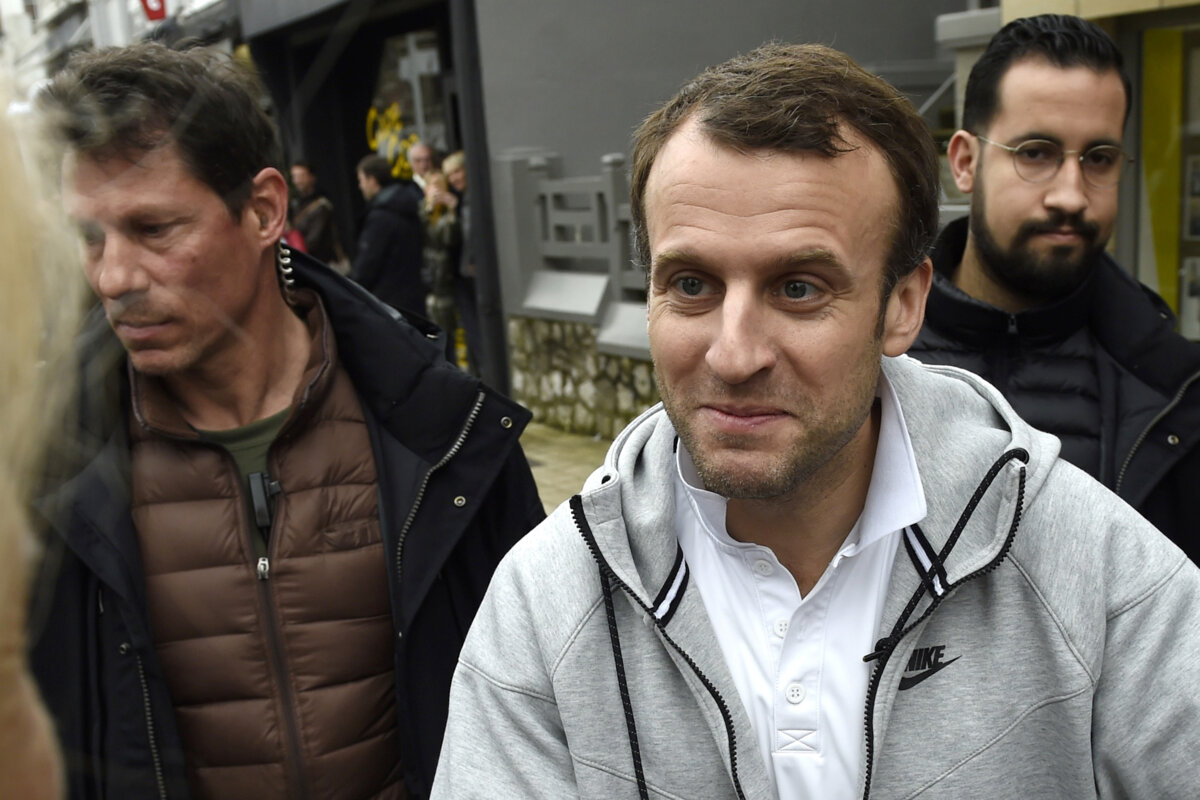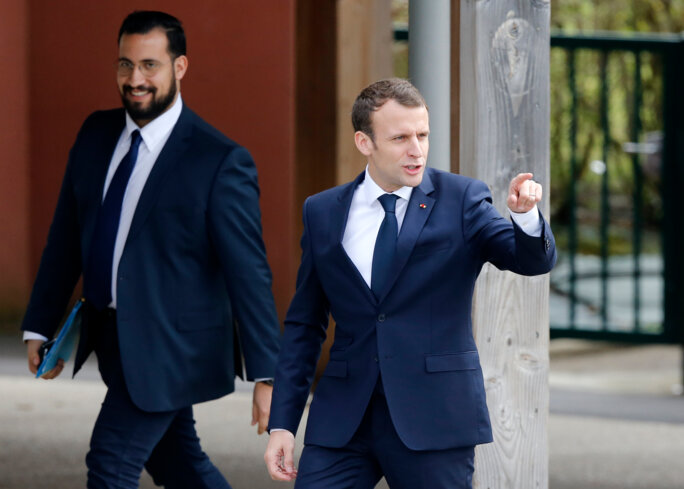Little more than a year after taking office, President Emmanuel Macron became engulfed in his first major political scandal, prompted by revelations in July 2018 of how his close personal security aide, Alexandre Benalla, then aged 26, who also had the title of deputy chief of staff to the president, had beaten up a man during May Day marches in Paris while illegally dressed with police insignia.
The vicious assault, in the Latin Quarter square Place de la Contrescarpe, was caught on mobile phone video footage, and first surfaced in the press more than two months after the events in a report by French daily Le Monde, published on July 18th 2018.
Benalla was also filmed, in the company of his friend Vincent Crase, a security agent for Macron’s LREM party and a gendarmerie reservist, roughly handling a woman friend of the victim and, as Mediapart was to reveal, violently and illegally “arresting” a demonstrator on the May 1st marches, the traditional French Labour Day parades, in another Left Bank location. One of the immediate questions raised was why Benalla appeared to be working alongside police, dressed as if one of them and helping with arrests, while they did nothing to prevent his violent behaviour. He was officially attending the policing of the marches as an “observer”.
But the scandal was to balloon into far wider questions, beginning with evidence suggesting a cover up of CCTV footage of the incidents by senior police officials and senior staff at the presidential office, the Élysée Palace. The Élysée showed extraordinary clemency towards Benalla, who served as a close personal bodyguard to Macron and his wife Brigitte, who was only forced out of his post after the outrage prompted by the media revelations which emerged two months after the events.
There was also speculation over Benalla’s steep rise to prominence at the Élysée, where he held the title of deputy to its chief of staff, after serving as a private bodyguard to Macron during his 2017 election campaign. The questions over his role as security aide were heightened when, after the initial scandal broke on July 18th 2018, the French president refrained from commenting the events during five days, even cancelling a planned public appearance at a stage of the Tour de France cycle race.
A further development in the scandal was Mediapart’s revelations of how Benalla, while still working at the Élysée, was involved in negotiating private security contracts with a Russian oligarch close to President Vladimir Putin and who was alleged to have links to organised crime. Mediapart also revealed that after his dismissal, Benalla continued to travel with several French diplomatic passports he kept, notably accompanying a delegation of Middle East businessmen to several African countries, when he reportedly met with Chadian president Idriss Déby.
Several judicial investigations into different aspects of the so-called “Benalla affair” (see this brief early timeline from FRANCE 24 ) are ongoing. One concerns the circumstances of the removal, in the hours following the publication of the report by Le Monde that broke the initial scandal on July 18th 2018, of a safe kept at Benalla’s home. Its removal was first recorded in a police search of the apartment on July 21st 2018.
The whereabouts of the safe and its contents have never been officially established. Benalla has claimed it contained arms that he legally possessed, and was moved from his home for safekeeping when he and his family left the apartment for temporary refuge from the media. But there has been growing speculation that it contained sensitive documents that were deliberately hidden from official investigations.
Mediapart has now learnt that a key witness to the events this week gave a statement to police in which he said he saw two staff of the French presidency, together with Benalla, in possession of the safe on July 19th 2018.
The witness, Chokri Wakrim, a member of the French army, was questioned by police during 12 hours on Tuesday. He told police that on the evening of July 19th 2018 he personally saw two of Macron’s close staff in possession of Benalla’s safe – and in the company of Benalla – at the Paris apartment of French businesswoman Pascale Perez.
Perez was not present that evening. She had lent her central Paris apartment to Benalla so that he, his wife and their baby could hide from the media camped outside their home in a south-west Paris suburb.
The two Élysée employees, both of whom had been key members of Macron’s 2017 election campaign, were Ludovic Chaker, an advisor to the French president’s personal chief of staff, and former gendarme Christian Guédon, member of the dedicated presidential security group, the GSPR.

Enlargement : Illustration 1

Guédon, who joined the GSPR with Benalla’s help – and in conditions that did not follow the rules in place – is the bodyguard who is the closest to Macron, with whom he engages in boxing rounds in the basement of the Elysée Palace. Guédon is also, according to his own CV, specialised for law and order missions in “breaking and entering, and infiltration”, and “discrete techniques for opening the locks of buildings and vehicles”.
Ludovic Chaker is a former serviceman with France’s 44th infantry regiment and specialised in intelligence operations.
Chaker, contacted by Mediapart via his lawyer, declined to comment about Wakrim’s statement. Guédon, who in June 2019 told current affairs programme Envoyé spécial, broadcast by public TV channel France 2, that he had no part in the disappearance of the safe, could not be reached before this report was published.
The Élysée Palace also declined to comment.
Contacted by Mediapart, Benalla replied by a mobile phone text message in which he included emojis signifying “dying with laughter” and “kisses”, and also uncomplimentary remarks about Mediapart.
In Wakrim’s statement to police, he also said he was present during a conversation between Benalla and Guédon in which Benalla asked Guédon to discretely empty the contents of a second safe, which was situated in Benalla’s office within the Élysée Palace, shortly before the office was searched by police, on July 25th 2018.
According to Wakrim, the contents from that safe were placed in a sports bag which he saw in Perez’s apartment. Wakrim said Benalla told him the contents included “sensitive” information about both the 2017 presidential election campaign and regarding the affairs of Emmanuel Macron and his wife Brigitte, notably “bank statements”. Wakrim added that he did not himself see the contents.
Chokri Wakrim was questioned by police as a simple witness, accompanied by his lawyer Arié Alimi, as part of investigations prompted in February 2019 by a report in French daily Libération which alleged that it was Wakrim who in fact removed the safe from Benalla’s home. Wakrim subsequently vigorously denied the allegation and announced he had filed a complaint against Libération for defamation.
At the beginning of his statement, he declared that he had “waited for this moment for months, almost a year to date”, adding: “This situation has driven me into a state of moral distress, prompting the first sick leave of my military career.” He said there had been “multiple and shattering” consequences for both himself and those close to him. He insisted that he had “always served [in the French armed forces] during 15 years, more than ten of them with the staff of the Special Operations Command [COS] with dedication and passion, always placing work above family life”.
He went on to provide the police with evidence of his schedule during the key dates in July 2018. On July 19th 2018, the day the police have established as being the most likely moment the safe was removed, he spent the day at his workplace at the Special Operations Command centre. After 6pm that day, he went to several appointments in Paris, as confirmed by his mobile phone geolocation records and other documents. According to his account, at 10pm he arrived at Pascale Perez’s apartment on the Avenue Foch, close to the Champs-Élysées avenue, where Benalla, Chaker and Guédon were present with the safe.
Pascale Perez told Mediapart that she was at the time in the Luberon region of Provence, in south-east France, while lending her apartment to Benalla and his family.
On July 20th 2018, geolocation records show Wakrim’s mobile phone was picked up by transmitters between 3.55pm and 5.23pm in the south-west Paris suburb of Issy-les-Moulineaux, close to Benalla’s home. Wakrim said he visited Benalla’s home for the first time only the following month, in August. He explained his presence in Issy-les-Moulineaux as a trip to the headquarters of security firm Velours Sécurité, which he had worked for concerning its contract with a Russian billionaire (see more here and here). The contract, which Benalla was involved in, is the subject of a separate judicial investigation in which Wakrim has also been questioned;
Contacted by Mediapart this week, a manager at Velours, speaking via a spokesman, confirmed that he had met Wakrim “for about one-and-a-half hours at the Velours main office, on July 19th or 20th, for talks on the subject of the Russian contract”.

Enlargement : Illustration 2

The mysterious case of the missing safe and what it contained has haunted Benalla for the past 18 months, beginning with the failed attempt by police to search his home on July 20th 2018 which had to be abandoned apparently because none had a key to the apartment. When it was finally searched the following day, the absence of the safe was recorded.
When he was questioned about the fact that same day – July 21st – he told them in a statement: “It must have been taken to a safe place by someone, but it’s not me who looked after that.” He added that he had wanted to move the safe because it contained weapons, but that suggestion clashes with the size of the safe – just 60cms tall – which would have been too small to hold certain arms in his possession which he later handed in.
According to French daily Le Parisien, Ludovic Chaker, one of the two Elysée staff who Wakrim said he saw with the safe at Pascale Perez’s apartment, was questioned by police on July 10th last year, when he admitted helping Benalla, his wife and their infant child to move house from Issy-les-Moulineaux to Perez’s apartment on July 19th 2018, but categorically denied taking part in moving the safe.
Meanwhile, paparazzo Sébastien Valiela, who works with Michèle “Mimi” Marchand, a high-profile broker of celebrity photo stories for the gossip press and who has a close relationship with Emmanuel and Brigitte Macron, also confirmed his presence at Benalla’s home at Issy-les-Moulineaux on 19th 2018, but similarly denied any involvement in the removal of the safe.
The police investigation appears to have established that Benalla’s safe was transferred from Pascale Perez’s apartment to an unknown destination in early September 2018. Questioned by Mediapart, Perez said “hired men” came to the apartment to pick up the safe in September, but she was unable to say for who they worked.
-------------------------
- The French version of this report can be found here.
English version, with some added reporting, by Graham Tearse


